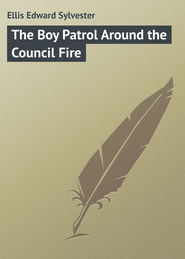По всем вопросам обращайтесь на: info@litportal.ru
(©) 2003-2024.
✖
Among the Esquimaux; or Adventures under the Arctic Circle
Настройки чтения
Размер шрифта
Высота строк
Поля
"Why not?"
"When we set out, and after reaching the hills, Docak told us we were thirty miles from home; he tells us now that we are ten miles less."
"Not quite ten mile – purty near," interrupted the native.
"Well, calling it ten miles, we have come about one-third of the way to the coast. No matter what system of measurement is followed we can't figure out that we have gone further than that."
"And not quite that far," suggested Jack, who was not less disappointed than they, but was quicker to rally.
"It isn't the thing calculated to make a chap feel good to learn a thing like that," he added; "but all we've got to do is to buckle down to it and we'll get there one of these days, with fair sailing and no more squalls."
"It is those squalls or blizzards, Jack, that are the real danger before us."
It was Rob who made this remark, and his friends knew he spoke the truth.
CHAPTER XXX
THE LAST PAUSE
The night slowly settled over the snow waste, and the little party, feeling no discomfort because of the cold, gradually sank into unconsciousness.
Just before slumber weighed down their eye-lids the dismal howl of a wolf echoed faintly across the plain. All heard it, and Jack and the boys believed that one of the brutes had struck the trail of the hunters, and would soon be hot upon it, with an eager pack at his heels. Jack asked the Esquimau whether they ought not to prepare for a fight, but he replied that there were no preparations to make. Each had his loaded gun and a good supply of ammunition; they could fight as well there as in any other place.
Docak showed no trepidation of voice and manner, and his coolness had a good effect upon the others. They were sure that, if there was any cause for alarm, he would feel it.
This confidence proved well placed; for that single cry was all that reached their ears. They slept, and were not molested.
But sometime during the night the fine snow began sifting downward, falling so gently that even the Esquimau was not disturbed. Through the long gloomy hours it silently descended, until when the daylight stole over the desolate plain, fully six inches had been added to the mass that covered the earth long before.
Sitting nearly upright and back to back, the pressure upon the sleepers was so slight and gradual that no discomfort resulted. All were so worn out that their slumber was profound, doubtless lasting as long as it would have done had no such snowfall taken place.
It was Jack Cosgrove who first opened his eyes, and his amazement may be imagined when he saw their laps buried out of sight, only the outlines of their limbs showing, while head and shoulders were weighted down with the feathery mass.
"By the great horned spoon!" he called, shaking himself free and rising to his feet, with such a flurry that the others were aroused; "wake up, for we're all snowed under, and, if we wait a few minutes longer, we'll be buried clean out of sight."
"What's the matter?" called Rob, being the next to climb to his feet; "has the snow tumbled in on us?"
"Yes; and more of it is tumbling every minute."
Docak was astonished that he had not been the first to awake, for his mind was burdened with anxiety for the rest. He forgot that, inasmuch as his labors had been far greater than theirs, his weariness of body was in more need of rest.
"What time be it?" he asked of the boys, who carried watches.
The answer showed that day had dawned more than two hours before. He sighed at the knowledge of the precious time wasted. Harder work than ever was before them, and when night came again they might count themselves fortunate if one-half the remaining distance was accomplished.
Rising to their feet, with their heads above the surface, they found the snow falling so fast that they could not see fifty feet in any direction.
"How can Docak keep his bearings?" asked Rob, in a low voice, of the others, when the native, walking a few feet, paused and looked earnestly about him.
"It doesn't seem to me that it is any harder for him to do so than it was yesterday when there was no snow falling."
"There is a big difference. We couldn't have done any better in the one case than the other, but he could see the sky. He knew where the sun was, though we did not; and there must have been something in the looks of the landscape to help, but there is none of that now."
"I can give you the right answer to Fred's question," said Jack, in the same guarded undertone.
"What is it?"
"When you ask whether Docak can keep the p'ints of the compass in his mind, and make sure that he is heading straight for home, the real answer is – he can't."
There could be no denying that the sailor spoke the truth. The native, like the Indians further south, may have possessed a subtle skill in the respect named beyond the comprehension of his more civilized neighbors, but, in all cases, there is a limit to such ability. Where there is nothing to afford guide or clue no living man can walk in a straight line – hour after hour, or hold his way undeviatingly toward a fixed point of the compass.
But, admitting this unquestioned truth, nothing was more self-evident than that it was sure death to stay where they were; the one and only thing left to them was to push on while the opportunity was theirs.
The Esquimau was a man of deeds rather than words. He showed no disposition to discuss the situation, and, beyond a few insignificant words, said nothing to his companions, who were as eager to be on the move as he. He stood a minute or two in study, and then, uttering the words:
"Come on – work hard – neber stop," began pushing through the snow with the vigor shown the day before.
The others followed in the order named, and with a resolution as strong as his to keep it up to the last verge of endurance.
It was necessary. In no other way could they escape the frightful doom that impended. Another condition was equally necessary; their efforts must be rightly directed. The guide must lead them toward the sea-coast. Had he the power to do so? The test was now going on, and the question would soon be settled.
They were terrible words spoken by Jack, but the time had passed when he felt it necessary to mince matters. He had done so at the beginning, but his companions were not children unable to bear the truth, however unpleasant it might be.
But, despite the good reason in what he said, neither Rob nor Fred quite credited its full meaning. While they could not explain how any person could guide himself unerringly, when there was no visible help for the eye, they believed that somehow or other he would "get there just the same."
They proved their own earnestness when Docak, after a long struggle through the clogging snow, stopped, turned about, and said:
"You be tired – then rest awhile."
"No," responded Fred, "I want no rest."
"Push on, then," added Rob, "unless you are tired yourself, Docak."
The idea that the native needed rest caused him a half-smile, as he faced forward and resumed his weary plowing through the snowy mass.
There was no call now to watch the countenances of the youths to protect them against freezing. The weather was so moderate that they would have felt more comfortable with their outer covering removed. If the blizzard had come back, it was in such a mild form that it could lay no claim to the name. It was simply snowing hard, and there was only a breath of air at intervals. Had there been anything approaching the hurricane of two days before, they could not have fought their way for a single rod.
When the guide, after another long interval, proposed a brief rest, it was acquiesced in by all. They had kept at it longer than before, and the pause must have been grateful to Docak himself.
"We are not going fast," remarked Rob, "but I am sure we have covered a good deal of ground since starting, and when we go into camp to-night there ought not to be many miles between us and the sea."
"Remember the mistake we made in our calculations," said Fred, warningly, "and don't count too much."
"How far have we come?" asked Jack, putting the question directly to the Esquimau.
"Dunno," he answered, turning about and resuming his labor.
"That's the last time I will ask him anything," growled the sailor, displeased at the curt treatment.











